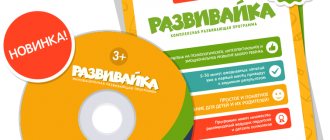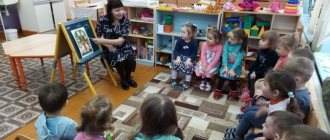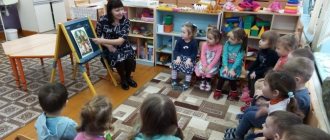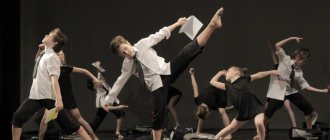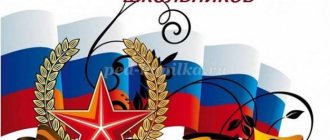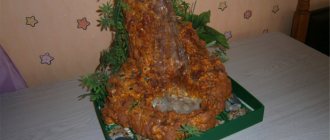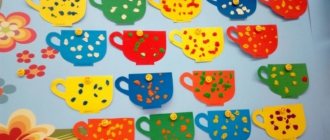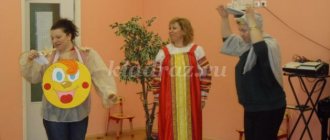Work program for patriotic education of preschool children
Elena Kondratyeva
Work program for patriotic education of preschool children
1. Target section 1.1. Explanatory note
According to the Federal Law “On Education in the Russian Federation”
dated December 29, 2012 No. 273-FZ (hereinafter referred to as the Federal Law
“On Education in the Russian Federation”
),
preschool education is the level of general education along with primary general, basic general and secondary general education. It is in preschool childhood that the value systems for the development of the child’s personality, the foundations of his identity, attitude towards the world, society, family and himself are laid. Therefore, the mission of preschool education is to preserve the uniqueness and intrinsic value of preschool childhood as the starting point for inclusion and further mastery of various forms of life activity in a rapidly changing world, to promote the development of various forms of child activity, and to convey social norms and values that promote positive socialization in a multicultural, multinational society.
Patriotic education of preschoolers is not only the education of love for one’s home, family, kindergarten, city, native nature, the cultural heritage of one’s people, one’s nation, and a tolerant attitude towards representatives of other nationalities, but also the education of a respectful attitude towards the worker and the results of his work, native land, defenders of the Fatherland, state symbols, state traditions and national holidays.
The concept of modernization of Russian education defines priority tasks, the solution of which requires the construction of an adequate system of psychological and pedagogical support. One of these tasks is the patriotic education of the younger generation.
The federal state educational standard for preschool education sets goals for patriotic education : creating conditions for the formation of the foundations of patriotic consciousness of children , the possibility of positive socialization of the child, his comprehensive personal, moral and cognitive development, development of initiative and creativity based on activities appropriate for preschool age .
The transformation of Russia into a post-industrial society, the processes of informatization, the increasing importance of the media as an institution of socialization, a wide range of information and educational resources open up new opportunities for the development of a child’s personality, but at the same time they carry various kinds of risks. In this regard, the problem of patriotic education of children and youth becomes one of the most pressing. At the same time, it acquires new characteristics and, accordingly, new approaches to solving it as an integral part of the holistic process of social adaptation, life self-determination and personality formation.
Patriotism is love for the Motherland, devotion to one’s Fatherland, the desire to serve its interests and readiness, even to the point of self-sacrifice, to defend it. Patriotic education of a child is the basis for the formation of a future citizen.
The work program for the patriotic education of children of senior preschool age (hereinafter referred to as
the Program ) was developed on the basis of the requirements of the Federal State Educational Standard for Preschool Education to the structure of the main general educational program of preschool education , an approximate basic general educational program of preschool education “From birth to school”
edited by N. E, Veraksa, T. S. Komarova, M. A. Vasilyeva, lesson systems by Aleshina N. V. “Familiarization
of preschoolers with the surrounding and social reality.”
Addressee of the Program . The program is intended for children 5-7 years old .
Timing of the Program . The program lasts two years.
Implementation time (organized educational activities)
for
children of the senior group - 10 hours, for children of the preparatory group - 12 hours.
The form of organization is full-time.
Features of the organization of activities - The program is implemented in the form of projects not only in organized educational activities, but also in the joint activities of the teacher with children, during regime moments, in independent children's activities, in interaction with families, which contributes not only to the patriotic education of children , but also formation of relationships with adults and peers, comprehensive development of the child’s personality.
1.2. Relevance of the Program .
Childhood is a daily discovery of the world. It is necessary that this discovery becomes, first of all, knowledge of man and the Fatherland, so that the beauty of a real person, the greatness and incomparable beauty of the Fatherland enters the child’s mind and heart.
Childhood is a crucial stage in the development of personality and its moral sphere.
The content of the Federal State Educational Standard notes the urgent need to intensify the process of instilling patriotism in preschoolers . Children at this age are very inquisitive , responsive, and receptive . They easily respond to all initiatives and are able to sincerely sympathize and empathize. For the educator , this is a time of fertile soil. Indeed, at this age great opportunities arise for the systematic and consistent moral education of children . The formation of the child’s spiritual foundation, emotions, feelings, thinking, processes of social adaptation in society takes place, and the process of realizing oneself in the world around us begins. It is this period of a person’s life that is most favorable for the emotional and psychological impact on a child, since his images are very bright and strong, and therefore they remain in memory for a long time, and sometimes for a lifetime, which is very important in the education of patriotism .
A favorable pedagogical environment created in a timely manner helps to instill in children the foundations of patriotism and citizenship . The concept of patriotism is diverse in its content - it is respect for the culture of one’s country, and a feeling of inseparability with the outside world, and pride in one’s people and one’s Motherland.
From the first years of life, a child must love his native land, culture with his heart and soul, experience a sense of national pride, which is called “putting roots in his native land”
.
The feeling of the Motherland... it begins in a child with his relationship to his family, to close people - to his mother, father, grandmother, grandfather. These are the roots that connect him with his home and immediate environment. The feeling of the Motherland begins with admiration for what the child sees in front of him, what he is amazed at and what evokes a response in his soul... And although many impressions are not yet deeply realized by him, but, passed through children's perception , they play a huge role in the formation of the personality of a patriot . of considerable importance for instilling in children interest and love for their native land. Gradually, the child gets to know the kindergarten, his family, his street, the city, and then the country, its capital and symbols. Hometown... We must show the child that his hometown is famous for its history, traditions, sights, monuments, and best people. To be a citizen, a patriot , is certainly to be an internationalist. Therefore, nurturing love for one’s fatherland and pride in one’s country must be combined with the formation of a friendly attitude towards the culture of other peoples, towards each person individually, regardless of skin color and religion.
Preschool age , according to psychologists, is the best period for the formation of love for one’s small homeland.
1.3. Goal and objectives of the Program
Goal: Development in preschoolers of citizenship , patriotism as the most important spiritual, moral and social values, readiness for active manifestation in various spheres of society.
Objectives: - formation of love for the native land (involvement in one’s home, family, kindergarten, city)
;
— formation of spiritual and moral relations;
— formation of love for the cultural heritage of one’s people;
- nurturing a love of respect for one’s national characteristics;
— self-esteem as a representative of one’s people;
- to form a cognitive interest in the world and, based on comparison, expand ideas about one’s homeland;
- a tolerant attitude towards representatives of other nationalities, peers, parents, neighbors, and other people.
1.4. Pedagogical principles and approaches to the formation of the Program . The basis for the education of moral and patriotic feelings in preschool children is the following principles:
the principle of person-oriented communication is the individual-personal formation and development of a person’s moral character. During the learning process, children act as active explorers of the world around them together with the teacher, and do not just passively adopt experience. Partnership, participation and interaction are priority forms of communication between teachers and children;
the principle of thematic planning of material involves presenting the studied material in thematic blocks: native family, native nature, native culture, native city, native country;
the principle of visualization is a broad presentation of visuals corresponding to the material being studied: illustrations, photographs of landscapes, monuments, attractions, etc.
The principle of consistency involves planning the cognitive material being studied sequentially (from simple to complex, so that children acquire knowledge gradually, in a certain system.
Principles of moral and patriotic education .
Interpenetration of educational tasks .
Coordinated, purposeful work of all participants in the educational process (family, child, teaching staff)
in a specially organized development environment.
A targeted approach to project participants, involving the use of forms and methods of work taking into account age and individual characteristics.
Using the social experience of past generations (national and family traditions)
.
Consistency in the moral and patriotic formation of personality: from close to distant, from small to great (my house - my street - my city - my country - my planet)
.
1.5. Targets at the stage of completion of the Program
By age seven:
• the child masters the basic cultural methods of activity, shows initiative and independence in play, communication, construction and other types of children's activities. • the child has a positive attitude towards the world, other people and himself, and has a sense of self-esteem. Actively interacts with peers and adults, participates in joint games. Able to negotiate, take into account the interests and feelings of others, empathize with failures and rejoice in the successes of others, adequately expresses his feelings, including a sense of self-confidence, tries to resolve conflicts;
• the child has imagination, which is realized in various types of activities and, above all, in play. Knows different forms and types of games, distinguishes between conditional and real situations, follows game rules;
• the child has a fairly good command of oral speech, can express his thoughts and desires, use speech to express his thoughts, feelings and desires, construct a speech utterance in a communication situation, can highlight sounds in words. The child develops the prerequisites for literacy;
• the child is capable of volitional efforts, can follow social norms of behavior and rules in various types of activities, in relationships with adults and peers, can follow the rules of safe behavior and personal hygiene;
• the child shows curiosity, asks questions to adults and peers, is interested in cause-and-effect relationships, and tries to independently come up with explanations for natural phenomena and people’s actions. Tends to observe, experiment, build a semantic picture of the surrounding reality, has basic knowledge about himself, about the natural and social world in which he lives. Familiar with works of children's literature, has basic understanding of wildlife, natural science, history, etc. Capable of making his own decisions, relying on his knowledge and skills in various activities.
1.6. Planned results of mastering the Program :
Child 5–6 years old:
• Knows his home address, name of the city, district, region.
• Has an idea of the symbolism of the city, district, region.
• Knows the names of nearby streets.
• Has an idea about the life and way of life of the people living in their hometown.
• Recognizes city sights in photographs and be able to talk about them.
• Knows the professions of his parents.
• Knows the rules of behavior in nature.
• Able to talk about the inextricable connection between man and nature, the importance of the environment for a healthy lifestyle of people.
• Distinguishes between some types of troops.
Child 6–7 years old
• Has brief information about the history of the city, district, region.
• Knows his date of birth, his patronymic, home address, telephone number; parents' names and patronymics; kindergarten address.
• Knows the coat of arms and flag of the Russian Federation and the Moscow region.
• Has an understanding of the President and the Government of Russia; about warriors-defenders of the Fatherland, about WWII veterans.
• Knows poetry, works of art by local poets and artists.
• Knows the rules of safe behavior in nature and on the streets.
• Has a basic understanding of nature conservation, nature reserves, and wildlife sanctuaries in the Moscow region.
• Understands involvement in the social and environmental environment, and recognizes himself as a full member of society.
• Has an idea about his native land; about people of different nationalities, their customs, traditions, folklore, labor, etc.; about the Earth, about people of different races living on our land; about the work of adults, their business and personal qualities, creativity, public holidays, school, library, etc.
Forms for tracking and recording results.
Monitoring is carried out in accordance with the Child’s Individual Development Cards at the beginning of each school year (October)
and at the end
(May)
.
Form for recording results – Child’s individual development map.
* Workshops, consultations for parents, open screenings, exhibitions of products of project activities are organized. A section is being maintained on the website.
work plan for the group is maintained , which reflects the work on patriotic education .
1.7. Logistics of the Program .
To implement the Program it is necessary :
— Corners for patriotic education in groups ;
— Cabinet of Patriotic Education ;
— Visual and demonstration material: presentations, illustrations, photographs, paintings, slides on the problem;
— Library of books with patriotic content ;
Methodical:
— theoretical and methodological literature,
- periodicals,
— materials on best teaching practices.
Materials for classes on patriotic education 1 . Reproductions of paintings
2. Methodological literature
3. Visual and teaching aids
4. Illustrations of various types of troops, portraits of heroes
5.Electronic educational resources: laptop projector, presentations, films
6. Audio recordings
7. Maps, atlas, globe
8. Fiction
9. State symbols
2. Organization of activities under the Program :
To implement the Program, it is necessary , first of all, to create a social situation for the development of children in kindergarten . The social situation of development is the social conditions in which the psychological and behavioral development of a person occurs according to the following indicators:
1. organizing the life of children in a group
2. style of relationship between the teacher and children
3. social qualities and cooperation skills in children
4.involvement of parents in the educational process.
Organization of children's life in a group .
1. The children's life and routine .
A rationally designed daily routine contributes to the formation of “dynamic stereotypes”
.
It is important to remember that inadequate stress on the child’s body leads to slow development and deviations in social life. development. The same consequences result from a reduction in the duration of walks , time for independent activities, and a lack of physical activity.
2. Constant emotional and practical interaction with adults and peers.
3. A developing subject-spatial environment has been created.
4. The group environment is psychologically comfortable for children .
Style of relationships between teachers and children .
Democratic style - the teacher , using various arguments, convinces the child of the advantages of a particular action. In this case, the choice is left to the child. This type of relationship requires an individual approach to children. It is this kind of unobtrusive care that children need most.
Developing social qualities and cooperation skills in children.
1. fostering in children a conscious attitude towards the norms of behavior in the society of their peers.
2. assistance in the exercise of rights by each child among his peers.
In professional activities, it is necessary to rely on age-related norms of behavior for children .
Interaction with parents.
It is necessary to involve parents in the educational process: consultations, workshops, information about the development tasks and achievements of the child, participation in projects.
Methods of patriotic education - One of the priority tasks of modern education is the transition to new technologies of training and education . One of the main and, probably, the most difficult tasks of a preschool educational institution is the development of the creative abilities of children and teachers . In my opinion, the source of interaction and co-creation between children and adults is design technology. The project method, as a form of organizing educational space, is innovative for preschoolers . It allows the child to act as a full partner in the pedagogical process based on the principles of cooperation. This is a method of pedagogically organized development of the environment by a child in the process of step-by-step and pre-planned practical activities to achieve the intended goals. — Targeted walks , excursions to places of military glory, to monuments, to the local history museum, etc.
— Stories from the teacher , conversations with children about the glorious history of their native country and hometown
— Observation of how people work on the territory of the kindergarten and in the city, how its appearance changes thanks to this work
— Demonstration of thematic slides, videos, illustrations
— Listening to thematic audio recordings, these could be the voices of birds of the Russian forest or the anthem of the Russian Federation
— Acquaintance with Russian folklore - fairy tales, proverbs, sayings, songs, games
— Acquaintance with folk art, embroidery, painting
— Acquaintance with the work of domestic writers, composers and artists
— Visiting thematic exhibitions or organizing them independently
-Participation in holidays
— Participation in feasible community service work
Forms of patriotic education
1. Various kinds of educational activities, studying state symbols of the Russian Federation, children gaining knowledge about the location, climate of their hometown, and its history. Various activities on the topic “Our native land”
2. Acquaintance of children with the culture and traditions of their native land, with the rituals of the Russian people, holding ritual holidays, excursions to the local history museum, organizing thematic leisure activities.
3. Fostering in children love and respect for their native nature, developing in them a sense of responsibility towards nature. It is necessary to strive to ensure that nature becomes clearer and closer to children . This is one of the important components of patriotism .
4. Introducing children to the heroic past of the Fatherland. Communicating to students the idea that people will always remember the terrible military events, honor the memory of those who died, and surround the people who defended their Motherland with attention and care. Conducting an annual month of military-patriotic education , organizing a drawing competition “Defenders of the Fatherland”
, conducting classes
“Heroes of War”
,
“Children-Heroes”
, as well as
“Courage Classes”
, in which children will address the exploits of Russian soldiers who showed unparalleled courage in those terrible times for the Fatherland.
Conducting a “Week of Remembrance”
with classes, conversations, arranging gifts and greeting cards for veterans, a
Victory Day
, and excursions to monuments.
5. Interaction with parents. Holding exhibitions of crafts and drawings with their participation on the theme “My Family”
,
“My mother is the best,”
etc., improvement of preschool educational institutions, holding competitions, holidays and matinees, joint work on the site.
Contact with parents and family is of great importance in solving the problems of moral and patriotic education . “Family Projects”
method is relevant .
Its essence is that each family, taking into account its own educational interests and priorities, prepares material on a pre-selected topic. The joint activities of adults and children contribute to their rapprochement and the emergence of common interests. Communication between parents and children is filled with cognitive, emotionally rich content.
Developed by:
teacher of MBDOU No. 26 “Fairy Tale”. .Iskitim
1 qualification category
Sharonova E, V
Long-term work plan for moral and patriotic education in the senior group, taking into account the Federal State Educational Standard for Education
SEPTEMBER
"My favorite kindergarten"
1. A tour of the kindergarten and an introduction to the work of the employees.
Goal: to introduce children to the premises and staff of the kindergarten.
2. A conversation about the importance of the work of all people working in kindergarten.
Goal: to deepen children’s knowledge that there are many people working in kindergarten who care about them.
3.Singing songs and reading poems about kindergarten.
Goal: develop children's speech
4. NOD “Our Kindergarten”
Goal: to consolidate, deepen, expand knowledge about the work of a teacher, assistant teacher, cook, doctor.
5. Conversation: “Where there is neatness, there is neatness”
Goal: to consolidate children’s knowledge and skills about etiquette.
6. GCD “Let’s play together”
Goal: to clarify children’s knowledge about a friendly attitude towards peers, about the need to play together.
7. Exhibition of children's drawings on the theme “My favorite kindergarten.”
Goal: to arouse in children a desire to reflect their impressions and ideas in drawings, to cultivate love for their kindergarten; friendly attitude towards peers; cultivate respect for kindergarten employees, a desire to help them, and bring joy.
OCTOBER
"Our Motherland-Russia".
- NOD “All kinds of mothers are important, all kinds of mothers are needed”
Goal: to consolidate knowledge about the work of a mother at home and at work, to cultivate feelings of love, respect and care for women; expand ideas about professions
- Excursion around the Voronezh region by “bus” (based on photographs).
Goal: to introduce children to the sights of the Voronezh region, to cultivate love for their native land.
- NOD "State Flag of the Russian Federation".
Purpose: to introduce the State Flag of the Russian Federation, the purpose, symbolism of colors and their relative positions.
- Conversation “Whoever wishes good for people gets it himself”
Goal: to teach to understand oneself through knowledge of one’s feelings, to promote the development of the ability to guess the feelings and mood of another person, to cultivate a sense of compassion and mercy.
- Reading competition “Poems about Mom.”
Goal: to cultivate feelings of love, respect and care for mother.
- NOD "National Anthem of Russia"
Purpose: to introduce the national anthem of Russia and the rules for its use, talk about its origin, purpose, content; identify its features that are similar to those of other musical works and different from them.
- Conversation “House, street, address.”
Goal: continue to introduce children to their hometown and develop communication skills.
- Conversation “Nature of Russia”
».
Goal: to form children’s understanding of the beauty of Russia’s nature, to cultivate a sense of pride that they live in such a beautiful country.
9
.
Holiday “Mom, you are the best in the world!”
Goal: to instill feelings of love and care for mom.”
10.Drawing on the theme “My Motherland”.
Goal: to arouse in children the desire to reflect their impressions and ideas in the drawing. Foster love and respect for the Motherland.
NOVEMBER
"My family"
1.NOD “My Family”.
Goal: to form an idea of the composition of the family, to cultivate love and respect for close relatives.
2. Conversation “Our Motherland-Russia”.
Goal: to clarify, deepen knowledge and ideas about Russia (territory, president, capital, language).
3. Entertainment “You are Voronezh, you are a beloved land...”
Goal: to expand children’s knowledge about their native land, to instill love for our small Motherland and pride in it.
4. Children's stories about family members based on personal experience.
Goal: to instill love and respect for close relatives, respect for their work.
5. Conversation “Respect your father and mother - there will be grace in your life.”
Goal: to cultivate love and respect for parents.
6. Drawing on the theme “My family”
Goal: to arouse in children the desire to reflect their impressions and ideas in the drawing. Cultivate love and respect for your family members.
7. GCD “Bake, bake some bread.”
Goal: to introduce children to the process of growing bread; give an idea of how bread came to our table; to cultivate a caring attitude toward bread, respect for human labor, and an understanding that everyone’s work makes our life and country better and richer.
DECEMBER
“According to the New Year’s card” (or “New Year at the gate.”)
1.NOD “What kind of holiday is New Year?”
Goal: to expand and deepen children’s knowledge about the New Year holiday, family, kind, fun.
2. Conversation: “What is good and what is bad?”
Goal: to reveal to children the meaning of the words “impossible”, “possible”, “must”; learn to evaluate actions and correlate them with words good and bad.
3. NOD “My native country!”
Goal: continue to introduce the native country (cities, anthem, flag of Russia); develop a sense of pride for the country. Create a desire to study more about Russia.
4. Making the album “Native Side”.
Goal: to instill love and respect for nature, to expand children’s knowledge about their native Voronezh region.
5. Entertainment “Me and my rights.”
Goal: to introduce the Convention on the Rights of the Child in a form accessible to preschoolers.
6. Conversation “The fauna of our region.”
Goal: to form an idea of the environmental conditions to which animals and plants have adapted in our region; develop in children a cognitive interest in the life of animals in our region; cultivate a caring attitude towards animals.
7. Holiday "New Year's Carnival".
Goal: to create a joyful mood in children.
8. Conducting the “Best New Year’s Toy” competition (together with parents).
Goal: to cultivate in children and parents a desire to invent and create something together.
JANUARY
"Folk Holidays"
1.NOD “Folk holidays in Rus'. Christmas"
Goal: to introduce children to the tradition of celebrating the Orthodox holiday of the Nativity of Christ; cultivate interest in national traditions. Expand children's knowledge about folk holidays in Rus'.
2. Entertainment “Carol has come to visit”
».
Goal: to cultivate interest in Russian folk holidays.
3. GCD “Get the job done.”
Goal: to teach children to finish what they start, not to quit their work halfway, to teach them to foresee the result.
4. Conversation “History of my city.”
Goal: to introduce children to the history of the city; develop the ability to understand the inextricable connection between “past” and “present”.
5. Looking at photographs depicting the most famous places in the area or city.
Goal: to instill interest and love for one’s hometown and region.
6. Exhibition of children's drawings "Miracle, miracle Christmas."
Goal: to arouse in children the desire to reflect their impressions and ideas in the drawing.
FEBRUARY
“Strong and mighty are the heroes of glorious Rus'” (for Defender of the Fatherland Day).
1. Examination of Vasnetsov’s painting “Three Heroes”.
Goal: broadening your horizons.
2. Listening to the recording of epics about Ilya Muromets, Mikita Selyaninovich, Nikita Kozhemyak.
Purpose: to introduce the exploits of heroes.
3. Excursion to the winter park.
Goal: to develop a sense of empathy and involvement in the fate of birds in winter, love and interest in native nature, in the symbol of Russia - the birch tree.
4. Conversation “My friends.”
Goal: to form in children the concept that people are not alike, but they are all equal; to instill in children respect and tolerance for people, regardless of their social origin, race and nationality, appearance, or physical disabilities.
3. GCD “State Emblem of Russia”.
Purpose: to introduce the image of the State Emblem of the Russian Federation, to form elementary ideas about the origin and function of the coat of arms of Russia, about the symbolic meaning of the color combination and images in it.
4. Maslenitsa holiday.
Goal: to cultivate interest in Russian folk holidays, interest in the history of Russia, and national pride.
5. Making gifts for fathers and grandfathers.
Goal: to instill a desire to take care of your close relatives.
6. GCD “Who guards the silence?”
Goal: expand children’s understanding of the Russian army, consolidate knowledge about various military professions and branches of the military; talk about the people who glorified our country during the war, about how people honor their memory.
7. Sports entertainment “The boys want to serve in the army.”
Goal: to develop speed, endurance, strength, and attention in children.
MARCH
"My mom"
1.NOD “About mothers of relatives and very important
».
Goal: to cultivate a kind, attentive, respectful attitude towards mother, the desire to care and help her.
2. Making a gift for mothers and grandmothers.
Goal: to cultivate a desire to please mothers and grandmothers.
3. Holiday “We congratulate mothers on March 8th.”
Goal: to cultivate a desire to congratulate mothers and grandmothers and take care of them.
4. Game – travel “Moscow – the capital of Russia”.
Goal: to introduce children to the sights of Moscow. To form in children the concept of Moscow - the capital, the main city of Russia; cultivate patriotic and civic feelings.
5. The plot-role-playing game “Daughters - Mothers”.
Goal: to promote the emergence of games on themes from the surrounding life, to develop the ability to get along with each other in a joint game.
6. Game - gatherings “Ladushki visiting grandma.”
Goal: to form in children an understanding of Russian folklore: songs, games, nursery rhymes, and to cultivate a love for oral folk art.
APRIL
"Our Cosmonauts"
1.NOD “Conquest of Space”.
Purpose: to give an idea of outer space; about the nearest star - the Sun, about the earth's satellite - the Moon; to cultivate respect for the difficult and dangerous profession of astronaut. Learn to fantasize and dream
2. Conversation “Coat of arms, flag and anthem of the Voronezh region.”
Goal: to introduce the image of the flag and coat of arms of the Voronezh region, to introduce the anthem of the Voronezh region; introduce children to the meaning of symbols and the symbolism of flowers.
3. Holiday “Russia is famous for its miracles - masters.”
Goal: to introduce people to folk crafts, to instill love and interest in Russian antiquity and folklore traditions.
4. Conversation “Me and my name.”
Purpose: to introduce the meaning of the names of children and parents; explain the concept of first name, patronymic, last name; consolidate the ability to understand and explain the meaning of Russian proverbs about family.
5. NOD “Easter Holiday”.
Goal: to develop interest in the culture of your people; develop the ability to apply knowledge about national culture in various activities.
6. Entertainment “Holiday of the Motherland - Russia!”
Goal: to cultivate love for our Motherland - Russia, to consolidate children’s knowledge about the flag, coat of arms and anthem of Russia; about the history of Russia.
MAY
"Spring Festival"
1. Entertainment “Vesnyanka”.
Goal: to clarify and systematize children’s ideas about spring; develop interest in the culture of your people.
2. Conversation “Victory Banner”.
Goal: to form a basic understanding of the history of the Fatherland, consolidate and generalize knowledge about the types of flags and their purpose; give brief information on the history of banners.
3. NOD “This Victory Day”.
Goal: to introduce children to life during the Great Patriotic War; to form patriotic feelings and interest in Russia’s past.
4. Excursion to the eternal flame with laying flowers at the obelisk of fallen soldiers.
Goal: to convey to children the idea that after many years people remember the events of the terrible war and honor the memory of those who died.
5. Design of the stand “My dad and grandfather are defenders of the Fatherland.”
Goal: to cultivate love and respect for close relatives as defenders of the Motherland.
6. Conversation “Grandparents together.”
Goal: to expand the idea of family, to teach how to navigate family relationships, to cultivate in children a kind, attentive, respectful attitude towards elders, and a desire to help them.
7. ECD "Children's Day"
Goal: to continue to introduce the Convention on the Rights of the Child in a form accessible to preschoolers.
8. Drawing competition “My favorite city”. (Together with parents).
Goal: to cultivate love and respect for our small Motherland.
